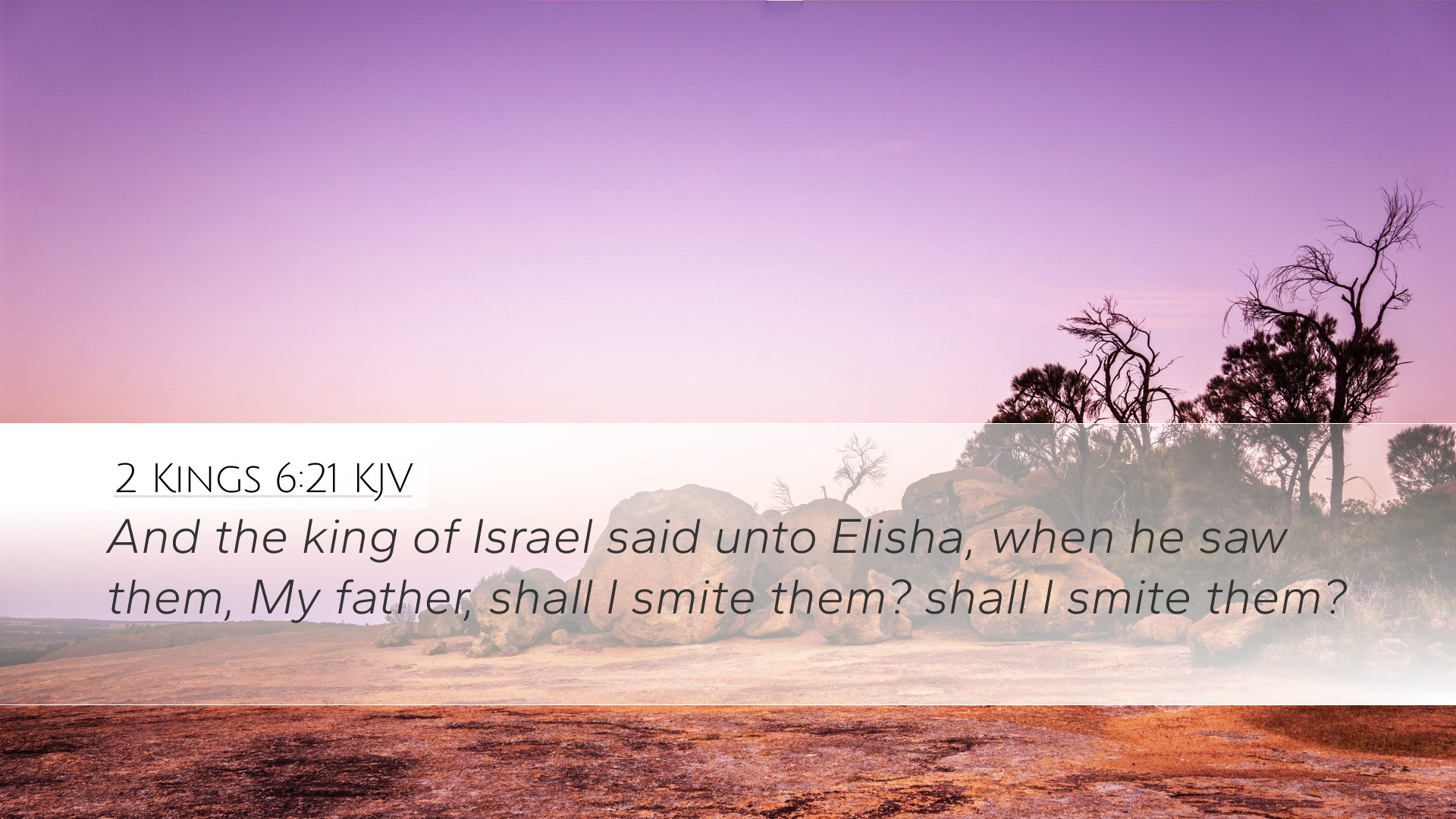Commentary on 2 Kings 6:21
2 Kings 6:21 is a pivotal verse in the narrative of Elisha’s prophetic ministry, particularly in the context of Israel's conflicts with Aram (Syria). This verse opens a window into the themes of divine intervention, mercy, and the transformative power of God's purposes in our human conflicts.
Verse Analysis
Verse Text: "And when the king of Israel saw them, he said to Elisha, 'My father, shall I strike them down? Shall I strike them down?'
This inquiry from the king reflects both a natural obedience to the prophetic authority of Elisha as well as a human instinct to retaliate against one's enemies. The repetition of the question indicates a heightened emotional state, suggesting the gravity of the situation and the king's eagerness to respond to the perceived threat.
Contextual Background
This verse occurs within a larger narrative in which Elisha, the prophet, has been instrumental in guiding Israel's military strategy against the incursions of Aram. Prior to this moment, Elisha had demonstrated his prophetic insight by revealing the plans of the Aramean king to Israel, thus saving the Israeli forces from ambush (2 Kings 6:8-12).
Following the capture of an Aramean army through divine orchestration, the king’s counsel demonstrates a crucial theological point: in the face of human animosity and the desire for revenge, God’s ways often challenge the natural instincts of conflict.
Theological Insights
1. The Nature of God's Intervention: Commentators such as Albert Barnes note how God's providence intervenes in the affairs of men. The striking of the Aramean army could seem justified, however, the divine directive through Elisha leads to mercy rather than destruction.
2. Elisha’s Authority: Matthew Henry emphasizes the role of Elisha as a mediator between God and Israel, underscoring how leaders must often seek divine wisdom over taking matters into their hands. His response—shifting the focus from vengeance to mercy—is a profound lesson in obedience to God’s higher purposes.
3. Forgiveness and Mercy: This interaction between the king and Elisha highlights a theme prevalent in the Hebrew Scripture: the call to forgiveness and the rejection of retaliatory violence. Adam Clarke expounds upon the notion that divine forgiveness is paramount, as exemplified by the mercy shown to Israel's enemies, contrasting the human inclination to exact revenge.
Lessons for Leadership
Pastors, leaders, and theologians can draw critical lessons from this verse:
- Seek Divine Guidance: Just as the king sought counsel from Elisha, leaders today must also seek divine wisdom in their decision-making processes, especially in times of conflict.
- Response Over Reaction: Elisha’s counsel encourages leaders to evaluate their responses carefully. In the heat of conflict, rather than seeking retribution, there is often a divine call to show grace and mercy.
- Modeling Christlike Attitude: The mercy shown to the Arameans serves as a precursor to the message of Jesus, who taught love for enemies. Leaders are called to embody this same attitude in their spiritual and community engagements.
Application for Believers
For students, theologians, and lay believers, this verse offers profound applications:
- Understanding True Peace: Christians are called to pursue peace over conflict, inspired by the example of Elisha's response.
- Empathy in Adversity: The mercy extended to a hostile force exemplifies the Christian principle to forgive and empathize even with those who may oppose us.
- Faith in God’s Purpose: Trusting in God’s overarching plan allows believers to respond to life's challenges not with fear or revenge, but with faith and hope.
Conclusion
2 Kings 6:21 catalyzes critical reflection on the nature of conflict and the divine call to peace and mercy. Through a blend of historical context, theological insight, and practical application, this verse serves as a rich resource for pastors, students, and scholars alike. The narrative invites each believer to consider how they embody these values in their lives, while also encouraging leaders to emulate Elisha’s commitment to divine wisdom over human instinct.


